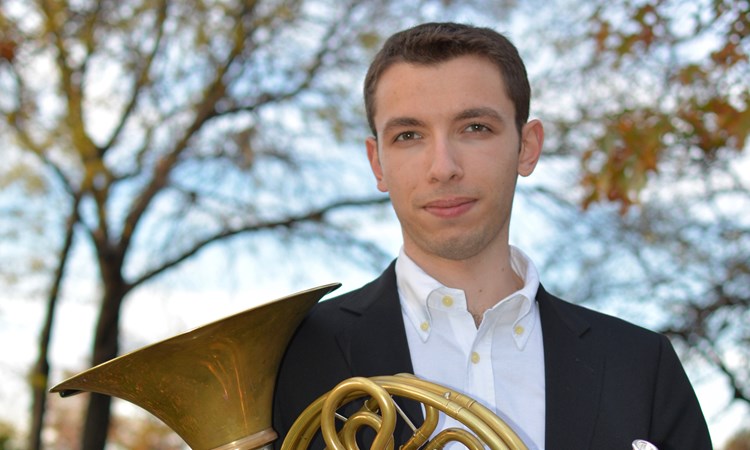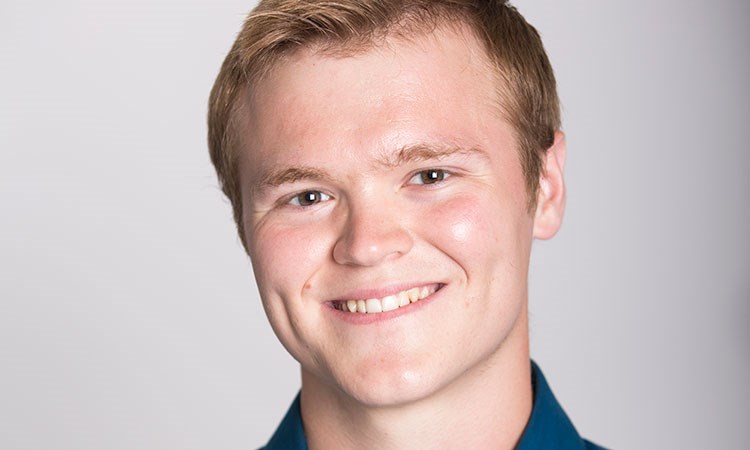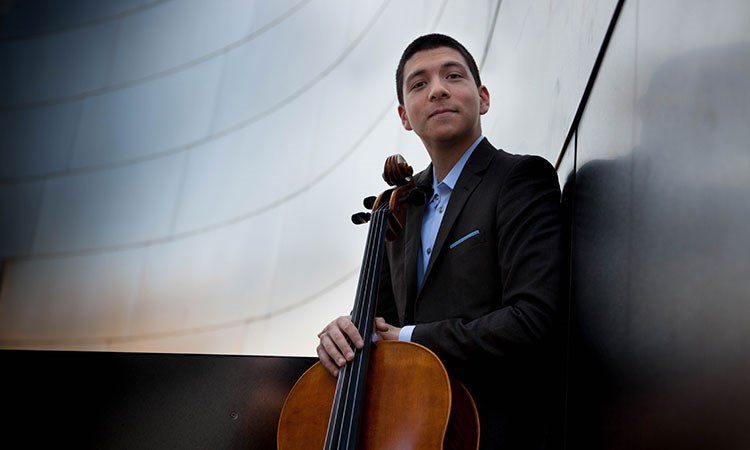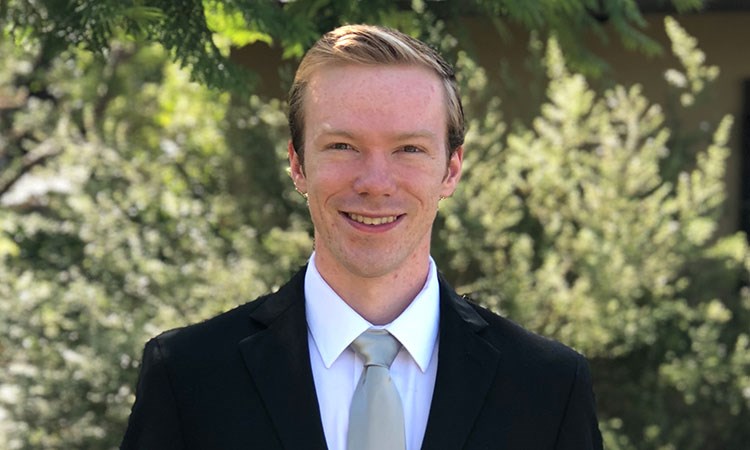New World fellows show dazzling bravura in some not-so-dazzling music

Roy Femenella performed Richard Strauss’s Horn Concerto No. 2 with the New World Symphony on Sunday.
The New World Symphony’s annual Concerto Showcase program brings members of the orchestral academy center stage to play solo works with the orchestra, often traversing rarely heard repertoire. Sunday afternoon’s concert at New World Center in Miami Beach also marked the return of former New World conducting fellow Joshua Gersen who has recently completed a four-year tenure as assistant conductor of the New York Philharmonic.
This year’s edition showcased some top-notch playing as usual. But, with one exception, the concertos selected by the players were all less than stellar.
Richard Strauss’s Horn Concerto No. 2 in E-flat Major was by far the concert’s most substantial work. One of the remarkable creations from Strauss’ late period when the composer left orchestral rhetoric behind in favor of more intimate expression, the concerto is both an instrumental showpiece and a lyrical tribute to the instrument that his father Franz Strauss played.
Roy Femenella, a Juilliard graduate now in his second year at New World, displayed tremendous technique and skill on one of the most difficult (and not always reliable) of instruments. Right at the start Femenella took charge with a vibrant opening horn call. His huge sound was astutely scaled down for the graceful Mozartean streams of melody, here phrased with a baritonal nobility. Femenella unleashed an array of brilliant fireworks in the repetitive triplets of the Rondo finale.
In both the flowing melodic sections and boisterous martial motifs of the concluding Allegro, Gersen’s fluid pacing avoided plodding routine. Carefully balancing the orchestra and the soloist, Gersen brought out Strauss’s lush glints of instrumental color.
Indeed, throughout the program, Gersen’s unobtrusive leadership was a model of fine collaboration. While supporting his soloists, he drew finely varied dynamics and tonal colors from the ensemble and attempted to present each of the scores in their best light.
Of the three other works on the program, André Jolivet’s Concertino for trumpet, piano and strings was the most interesting. In the 1930’s Jolivet founded the composers’ society Le jeune France (The Young France) along with Olivier Messiaen. This group rejected the neo-classicism favored by Stravinsky and the populist influences of Les Six (a group that included Poulenc, Honegger and Milhaud). Jolivet and his compatriots favored a more edgy, primitive idiom.
The Concertino is a set of atonal variations for the trumpet with the prominent piano part acting as a jazz-inflected undertow. A mere ten minutes in length, this lightweight essay is highly entertaining. Steven Franklin, a first-year fellow who studied at Philadelphia’s Curtis Institute, was a dynamic exponent of the work’s slight musical content. A brief slow section of Bartokian inflected night music proved haunting. Im the muted sections, instrument, Franklin managed to infuse some elegance into the music’s austere harshness. Gersen kept the rhythm strict and tight in the fast concluding section, drawing out the urgency and astringent energy.
There is a reason why some scores are rarely or never played and the remaining two works fell into that category. Aram Khachaturian’s Concerto-Rhapsody in D minor for cello is one of the innumerable scores written for the great Mistislav Rostropovich. The 1963 work is basically comprised of one theme which is repeated endlessly, sometimes in varied guises. In one of the most vulgar openings imaginable, that theme is immediately introduced by four horns. While the melody is alluring, it cannot support a twenty-five-minute score with this composer’s slender invention.
Still the score served as a virtuoso showpiece and first year fellow Nicholas Mariscal was fully equal to its demands. A third prize winner in the 2014 Sphinx Competition who studied at Indiana University and the University of Southern California, Mariscal drew a deep tone from his 1640 Francisco Ruggieri instrument (on loan for the performance). In the score’s one imaginative stroke, the soloist launches into a nearly three- minute cadenza immediately after the orchestral introduction. The sheer speed of Mariscal’s bow strokes, sometimes executed high on the instrument’s bridge, was breathtaking. The cellist played the entire work with passionate commitment and negotiated the harmonic leaps in the rapid concluding moments with assurance. Gersen managed to bring out as much subtlety as was possible in the blatant orchestration, particularly highlighting the harp lines.
The program opened with the Rondo espagnole for piano and orchestra by Cosmé McMoon. Best known as the accompanist for the notorious Florence Foster Jenkins (dubbed “the world’s worst singer”), McMoon (1901-1980) never heard a performance of his rhapsody during his lifetime. The work was given its belated world premiere by New World fellow Thomas Steigerwald with the Youth Orchestra of San Antonio in 2018. An exercise in cinematic classical music with an opening that suggests the theme of Rachmaninoff’s Piano Concerto No. 2, McMoon’s score amounts to a Warsaw Concerto or Cornish Rhapsody with a faux Spanish accent. Its melodic content would be diverting at shorter length but at nearly twenty minutes, this concoction is heavily bloated.
Streigerwald, an Eastman and Juilliard graduate in his first New World season, obviously believes in this work. He managed the pyrotechnical hurdles with considerable bravura and drew as much dynamic variety and supple coloration as possible from the house Yamaha. Gersen’s propulsive conducting managed to make the music sound better than it is.
The New World Symphony season continues with Matthias Pintscher conducting Ligeti’s San Francisco Polyphony, Neuwirth’s Mascot/ Clocks without Hands and Pintscher’s own mar’eh with violin soloist Renaud Capucon 7:30 p.m. February 16 at New World Center in Miami Beach. nws.edu; 305-673-3331.
Posted in Uncategorized
Leave a Comment
Mon Jan 28, 2019
at 12:42 pm
No Comments


